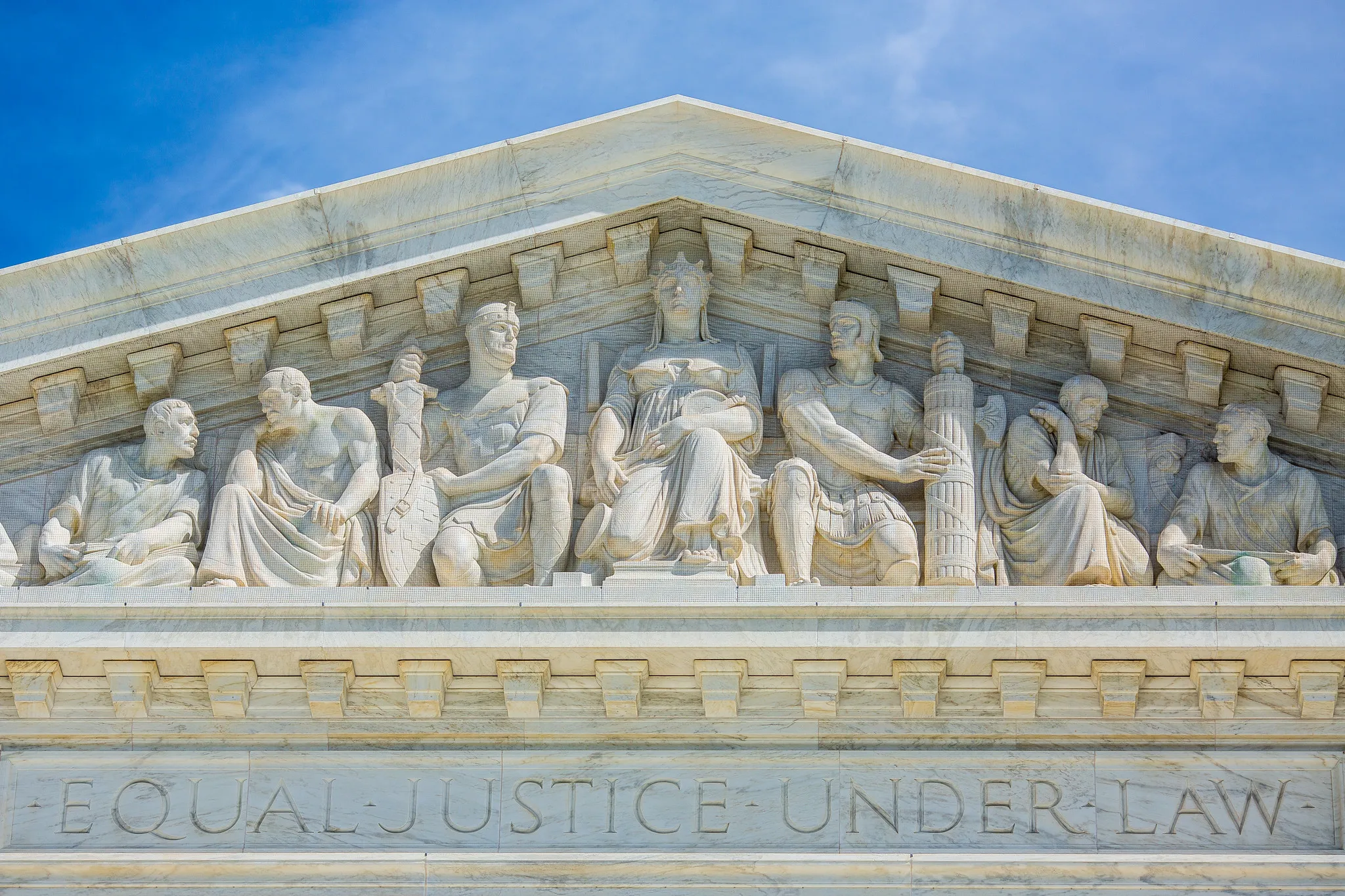Oral argument suggests narrow ruling to uphold disputed tax
ARGUMENT ANALYSIS
on Dec 5, 2023
at 4:04 pm
The justices heard oral argument in Moore v. United States on Tuesday. (Thomas Hawk via Flickr)
The Supreme Court on Tuesday appeared likely to reject a challenge to the constitutionality of a provision of a 2017 corporate tax reform law that taxes the undistributed profits from U.S. shares of foreign corporations that are majority American owned. The Washington state couple at the center of the case is seeking a refund of the one-time $15,000 increase in their tax bill as a result of the law, but the federal government’s top lawyer told the justices that a ruling in the couple’s favor could cause a “sea change in the operation of the tax code” and cost “several trillion dollars” in lost revenue – an argument that seemed to draw support from a majority of the justices.
The tax at the center of the case is known as the mandatory repatriation tax, a one-time tax imposed on the earnings after 1986 of foreign corporations in which U.S. shareholders own at least 50% of the stock. The tax applies regardless of whether the earnings were distributed to shareholders or whether the shareholders owned the shares when the corporation made the earnings on which they are being taxed.
In 2005, the challengers, Charles and Kathleen Moore, invested $40,000 in an Indian corporation that aids small farmers in India – a sum that netted them 13% of the corporation’s shares. The corporation reinvested its profits in the business, so that they did not receive any distributions or dividends from the company. But when the mandatory repatriation tax was enacted in 2017, they received a tax bill for roughly $15,000.
The Moores went to federal court, where they argued that the mandatory repatriation tax violates the Constitution’s apportionment clause, which requires taxes to be imposed so that its state’s share is proportional to its population, because it taxed their personal property, rather than any income from the corporation. And although the 16th Amendment to the Constitution carves out an exemption to the apportionment clause for income taxes, they contended, the Indian corporation’s profits did not qualify as their income because they never received it.
Representing the Moores on Tuesday, lawyer Andrew Grossman told the justices that the term “income” has long been understood to refer to gains that the taxpayer actually receives, such as rents, wages, and dividends. A “gain is not income unless and until it has been realized by the taxpayer,” he insisted. In this case, he asserted, the Moores did not get anything from their investment, so that the tax is instead a “tax on the ownership of property” that violates the Constitution.
U.S. Solicitor General Elizabeth Prelogar, representing the Biden administration, countered that the drafters of the 16th Amendment would have understood the Supreme Court’s cases to allow taxes like the mandatory repatriation tax. And she assured the justices that they could uphold the tax and the lower court’s decision with a narrow ruling: It is enough to say, she explained, that the mandatory repatriation tax targets income that foreign corporations actually received, but Congress permissibly attributed to U.S. shareholders.
Several of the justices appeared persuaded by Prelogar’s reliance on the amendment’s text and history. Justice Sonia Sotomayor noted that the concept of “realization” – the idea of receiving money, which the Moores insist is required before something can qualify as income – was “very well established” when the 16th Amendment was adopted. The drafters could have used the term in the amendment, but did not, she observed, and there are “examples of Congress taxing unrealized income.”
Grossman pushed back, contending that when the 16th Amendment was adopted, the term “income” was commonly understood to refer to gains that had actually been realized.
But Justice Ketanji Brown Jackson was unpersuaded on this point. Why, she queried, should the justices rely on the common meaning of the term “income,” rather than its legal meaning, if the 16th Amendment was adopted to respond to the Supreme Court’s cases on the meaning of the term “income”?
Justice Elena Kagan chimed in, telling Grossman that, aside from the question of whether the 16th Amendment imposes a requirement that income be realized, “there is quite the history in this country of Congress taxing American shareholders” on their gains from foreign corporations because the federal government can’t tax foreign corporations themselves, but Congress wants to ensure that U.S. shareholders can’t “stash” their money overseas and watch it grow. Why, Kagan asked somewhat rhetorically, is this any different?
And Justice Brett Kavanaugh appeared sympathetic to Prelogar’s plea for a narrow ruling. Even if the Supreme Court does not decide, he said, whether the 16th Amendment requires income to be realized before it can be taxed, in this case the income was indeed realized by the corporation and then attributed to the shareholders by Congress.
Such a rule, as far as both Kavanaugh and Justice Amy Coney Barrett were concerned, would allow the court to sidestep the 16th Amendment question altogether. Barrett asked Grossman whether the question before the justices was more appropriately characterized as a question of fairness – when Congress can attribute the Indian corporation’s income to the Moores.
Kavanaugh echoed this line of thinking later, describing the dispute as an “an argument about timing.” If the corporation receives the income and then Congress attributes it to the Moores, he suggested, the “only real wrinkle” is that the mandatory repatriation tax goes back and captures income from earlier years.
But much of the argument focused on concerns about the possible broader implications of the court’s ruling. Some of the court’s conservative justices worried that, as Grossman put it, a ruling for the government would “open the door to taxation of practically everything.” Justice Clarence Thomas asked whether Congress could tax an increase in the value of real estate, while Justice Neil Gorsuch asked about the possibility of a tax on retirement investment accounts, which millions of Americans hold.
But it was Justice Samuel Alito, who faced (but rebuffed) calls to recuse himself from the case because of his ties to an attorney involved in the Moores’ side of the case, who was perhaps most skeptical of the government’s position. Alito pressed Prelogar on a variety of scenarios, including whether Congress could levy a tax on the appreciation in a stock’s value or the increase in the value of mutual funds. And he was skeptical of Prelogar’s assurances that the court did not need to address those questions, and that Congress did not have a tradition of imposing such taxes.
Other justices, however, were more persuaded by Prelogar’s insistence that the scenarios raised by Alito, Gorsuch, and Thomas were “hypotheticals that are unlikely ever to come to pass.” Congress, she explained, generally opts to impose taxes based on income that has actually been received because it is easiest from an administrative perspective. The justices should not rely on such “far-fetched” possibilities to invalidate critical portions of the tax code, she concluded.
Kagan agreed, dismissing the scenarios advanced by her colleagues as taxes “we’ll probably never see in our lifetime.”
Kavanaugh added that his colleagues’ hypotheticals were “far-fetched” because “members of Congress want to get reelected.”
If some of the court’s conservative members were worried about the possible implications of a rule for the government, other members of the court expressed concerns that a ruling for the Moores would put – as Kagan said – other “very established taxation schemes” at risk. These concerns, particularly when combined with the comments by Kavanaugh and Barrett, seemed to suggest a narrow ruling for the government, leaving broader questions for another day.
This article was originally published at Howe on the Court.






